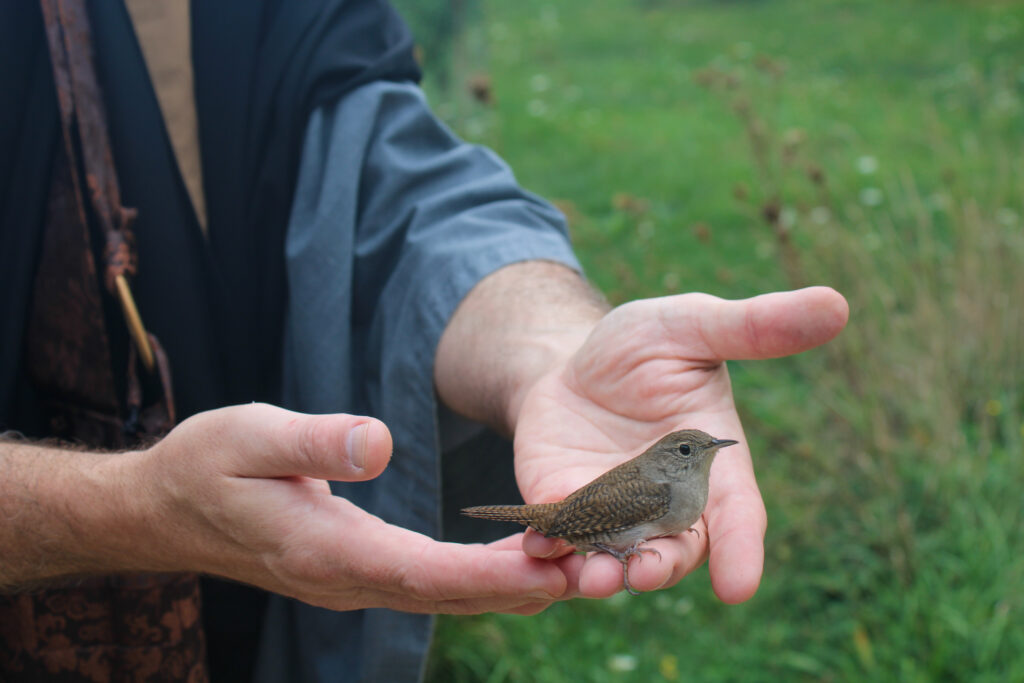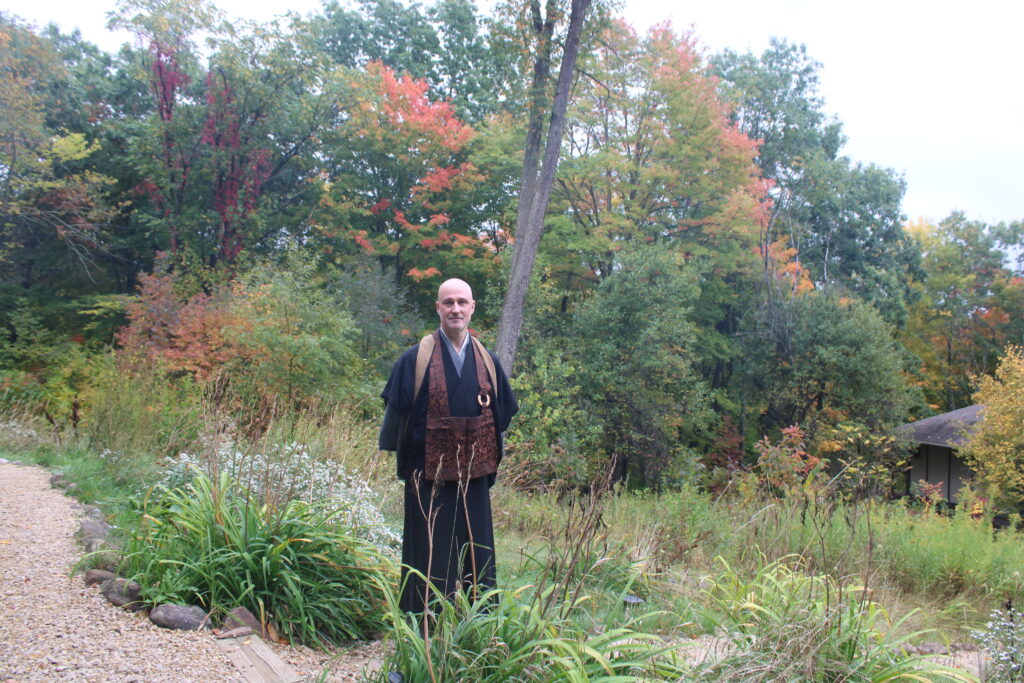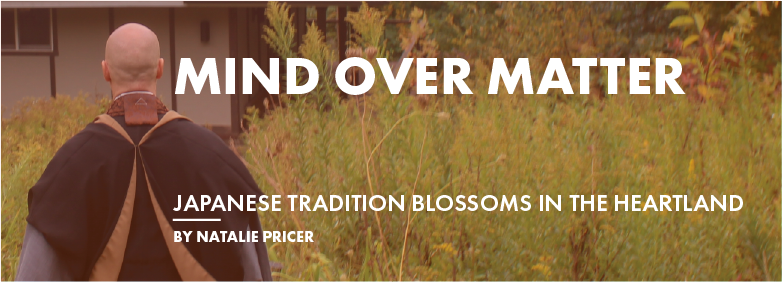On a crisp autumn morning, a clementine-sized bird flew into my car window opening and, in a partially concussed daze, trapped itself.
Without hesitation, Meido Moore, the abbot of a Rinzai Zen monastery called Korinji, near the Wisconsin Dells in the central part of the state, made his way over to my car. He cupped his hands and used them to gently encircle the stunned creature. The bird contentedly plopped into his palms.
In one swift motion, Moore swept his hands upward and let the bird go flying into the sky, just as Wisconsinites are opening up to ideologies like Zen to free their minds.
The more than 800-year-old Rinzai Zen tradition, one of two major sects of Japanese Buddhism that was practiced by feudal lords and the samurai, has found its way to Wisconsin. Now, Wisconsin-based Zen masters are looking to conserve this ancient Japanese tradition while figuring out how to fulfill the modern American’s unique hunger for spirituality in a culture smitten with science.
A 2014 Pew Research Center study found that a growing percentage of Wisconsin adults are identifying less with Christianity and gravitating more toward a lack of general religious affiliation, with 25% of adults identifying as unaffiliated with a religion.
That doesn’t mean people aren’t craving some sort of spiritual relief.
“There is a deep spiritual hunger which is not being met,” Moore says. “There is a basic nihilism that people have fallen into hopelessness with the killing of the old worldviews.”
In order to fill this hole left by a decline in traditional religion, spirituality is taking on a new shape, which looks very different from what it has looked like in the past: the secular mindfulness movement and fascination with meditation, yoga and other ideas stemming from centuries-old Eastern philosophies have entered the mainstream of American life.
“We’ve had changes in society. I think people are more anxious and more depressed than they used to be,” says Kenneth Kushner, a Rinzai Zen master and professor emeritus in UW–Madison’s Department of Family Medicine and Community Health. “The turn away from traditional religions … I think people get solace from [meditation].”
Cortland Dahl, the chief contemplative officer of Healthy Minds Innovation at UW–Madison’s Center for Healthy Minds, says when it comes to Western Buddhism, there are two sides of it — traditional Buddhism and Buddhism in pop culture, which branches off into a wide variety of practices ranging from conservative to progressive.
“I think it’s a healthy tension that you have that range and a healthy dialogue and a push-pull in either direction,” he says.
Liam Hutchison, a 27-year-old student of Moore’s, says trends in religion are responsive to what is going on in the world, and right now it feels like the world is on the brink of disaster. He says people can benefit from a path of religious practice that deepens their ability to engage with the world as it is.
Hutchison started his own spiritual path when he was in college at UW–Madison in his early 20s.
“The world is an overwhelming place, and I was spinning my wheels to turn my existential angst into something useful,” he says.
Hutchison grew up surrounded by Christianity, but he did not find it helped him address his own suffering. So he started experimenting with different meditation techniques.
Eventually, he discovered one of Korinji’s practice groups that meets on Madison’s west side in the Quarry Arts Building. The energy of the teachers and the vitality and vibrancy of the group resonated with him, Hutchison says. He’s been studying at Korinji ever since.

Zen enters Wisconsin
Korinji is a 17-acre Rinzai Zen monastery around 50 miles from Madison that usually houses three to six full-time monks. It has two buildings, a garden, an orchard and long, serpentine trails used for walking meditation.
Moore founded Korinji in 2017 after his former teacher, Tenzan Toyoda Rokoji, a Rinzai Zen master and martial arts teacher. According to the Japanese Culture Center’s website, Toyoda, who is also referred to as Fumio Toyoda Shihan, endured vigorous training in Japan before immigrating to the U.S.
Toyoda then founded several martial arts organizations and the Japanese Culture Center in Chicago, which housed a branch temple affiliated with Chozen-ji, the first Rinzai headquarters temple established outside of Japan, located in Honolulu. Moore studied under Toyoda’s guidance for seven years in residence at his training hall in Chicago and for 11 years in total. Moore says it was Toyoda’s dream to open a more traditional monastery in the West aside from his urban temple, but he died young at the age of 53 as he was establishing it, so Moore stepped in to finish what his teacher started.
The pair settled on Wisconsin’s Driftless region, with its stunning topography, verdant hillsides and serene nature. During my visit, I was swept away by the abundance of vibrantly colored trees enclosing the grounds, the refreshing earthy scent, the jade-colored apples scattered under trees and the cheerful chirping of carefree birds.
While every training is unique to the student, a typical day at a Rinzai Zen monastery can include rigorous meditation and breathing methods, physical culture such as manual labor to maintain the grounds or various forms of martial arts, and different kinds of artistic disciplines such as tea ceremonies, flower arranging and calligraphy.
Kushner founded the Chosei Zen organization in 1982, which was first called the International Zen Dojo of Wisconsin. Its main center, called Daikozen-ji, on Madison’s east side practices Zen, meditation, Kendo, a kind of Japanese fencing, and Kyudo, which is Japanese archery.
Both Moore and Kushner say preserving the authentic traditions of Zen passed down and shared across generations is vital to them. Yet with the boom of spirituality trends already spreading across the Western landscape, a huge range of practices influenced by Buddhism are being born, Dahl says.

Zen meets mindfulness
As with any religious reform, Zen is adapting to the existing Western culture. Particularly notable is the overlap between Buddhism and research on mindfulness and its benefits for mental health.
By now, most people are familiar with the extensive psychological and psychiatric research in mindfulness, which has soared exponentially since 2006, according to the Mindfulness Journal, with more than 16,500 papers published between 1966 and 2021.
Kushner, who has a doctorate in clinical psychology, says the integration of mindfulness principles into health care has proven mindfulness to be extremely helpful for people, and that if he were starting his career now, he would be fascinated by how promising the research on mediation is.
UW–Madison’s Center for Healthy Minds is considered one of the leading organizations in the field of mindfulness in the scientific community. Dahl says that through his work, he aims to bridge the worlds of Buddhism and modern research in a way that will be helpful for people.
While Kushner and Moore both say they support anything derived from Buddhism that offers benefits to people, they stress there are important distinctions between the secular mindfulness movement and traditional Zen Buddhism.
“There’s this mixture of Buddhist teaching with psychotherapy, with New Age stuff, a lot of things that maybe don’t fit or, from my standpoint, maybe shouldn’t be mixed with it,” Moore says. “It’s hard to say when you show up at a Buddhist place these days in the States, you don’t know what you’re going to get.”
Kushner says learning about Buddhism only in the context of mental health can make people lose sight of what Zen is meant to address.
“I think there’s somewhat of a misconception about Zen in the West that it’s for stress management [and] relaxation,” Kushner says. “And I’m not saying that to disparage those things. In fact, that’s why I started. But at the end of the day, Zen and any form of Buddhism was set up to address deep existential issues.”
Zen has a softer face in the West, as opposed to traditional Rinzai methods, Kushner says. Hutchison says the first time he went to a Rinzai meditation session he remembers how when someone started to move, they were corrected with a shout from the front of the room.
That being said, Hutchison says this friendlier lens works for our culture, as people are increasingly anxious and in pain and are looking for means to deliver relief from these emotions.
Wisconsin Rinzai pushes forward
Moore says he aims to pass down the Rinzai Zen traditions passed down to him by training the next generation of Zen masters in Wisconsin, but both Kushner and Moore say they are open to incorporating Zen into some aspects of contemporary Western culture as well.
In the ever-changing digital age, Korinji and Chosei Zen have come to embrace digital outreach to Wisconsinites and those interested in Rinzai Zen around the world by maintaining active social media accounts across several platforms.
“Finding out about the place should be easy,” Moore says. “Getting involved should be easy. Information should be easy, but the practice itself should remain with integrity and rigor.”
Chosei Zen’s Institute for Leadership is an affiliate organization that offers leadership workshops based on applying the principles of Zen training, and Kushner teaches his own program aimed toward leaders in health care.
What’s more, both Chosei Zen and Korinji welcome people from all backgrounds, hosting beginner meditation sessions available for people from different religions and backgrounds.
When Wisconsinites feel trapped and confused, the hope is that with the guidance of Buddhism, or some form of it, they can be set free, allowing them to stretch their wings and reach new heights of expanded consciousness, just as the bird once trapped in my car is now free to soar through Wisconsin’s mystical Driftless region in a state of bliss.
